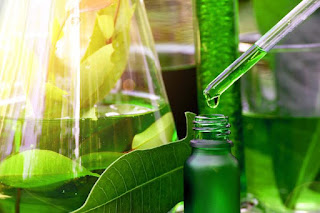Over the last few years, we've heard so much about extracts from medicinal plants. From the health-shaping abilities of saw palmetto, green tea and ginger to the antibacterial power of turmeric, these plant extracts have been hailed as the "new spices of the medical world."
Plant extracts from natural sources have been used for centuries to treat a variety of conditions and ailments. Many of today's supplements are derived from plants. They can be found in foods like cranberries, grapes and garlic, or they can be extracted from herbs like chamomile, fennel, mistletoe, black cohosh, licorice and motherwort. Many of these herbs are in use today as drugs to relieve symptoms of depression, anxiety and bipolar disorder. Others are in use to treat such conditions as high blood pressure, ulcerative colitis, migraine headaches, restless leg syndrome, Crohn's disease, heartburn and varicose veins.
So why would pharmaceuticals want to put plant extracts into pill form? After all, there's a good chance that those pills will contain the same active ingredients as the herbs they're derived from. After all, some plants have been studied more thoroughly than others, and some have been shown to have medicinal qualities that make them particularly useful as supplements. Extracts from green tea and turmeric, for example, have been found to have anti-inflammatory and antioxidant qualities.
But is it really necessary for pharmaceuticals to use plant extracts in supplements? The answer depends on your definition of a supplement and whether or not you have a health condition that warrants the use of a supplement. If you don't need a supplement, it's probably not necessary for pharmaceuticals to make one for you. If you have a health condition or if you take medications, it might make sense to take a supplement.
Before you decide to use plant extracts as a dietary supplement, you should understand how they work. Extracts from certain herbs, when taken as a single dose, may provide some benefit to those with certain diseases or conditions. For most people, however, adding a supplement to a healthy diet and lifestyle can make a big difference.
There are two major types of plant extracts available. One type of extract works well as an appetite suppressant. The same goes for another type of extract that increases the level of dopamine in the body. But these aren't your traditional prescription drugs. These are herbs, so they don't get converted into prescription drugs, and they may actually help promote better health instead of suppressing your symptoms.
Plant extracts also differ from pharmaceuticals in that they do not contain harmful synthetic chemicals. These extracts can be found in over hundreds of products, including teas, chewing gums, lotions, and supplements. In fact, there are several different herbal dietary supplements on the market today. To choose the right supplement, look at the ingredients. Are they made from all natural ingredients? Look at the dosage levels to determine how much of the supplement is needed. Ask your doctor or pharmacist about any potential interactions. Always check with your pharmacist before starting a new supplement, especially if you've had negative reactions to other pharmaceuticals in the past.




No comments:
Post a Comment